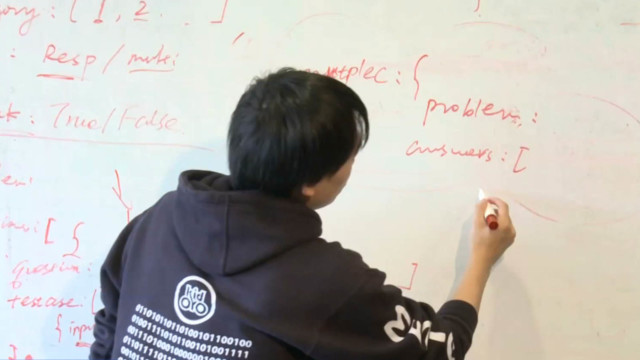This month, U.S. President Trump signed an executive order calling for a review of a workers visa program. American companies use the H1-B visa to get highly skilled workers from overseas.
The tech and engineering industries heavily support it, while Trump and others believe it takes jobs from Americans.
CGTN’s William Denselow reports.

At just 13-years-old, Zachary McCann is already helping get his parent’s veterinarian practice off the ground. For around five years he’s been taking coding classes organized by the nonprofit kidOYO.
Now he’s got the skills required to build an app for the family business. “One week you could be learning Python, another week you could be learning Unity and C-Sharp and just manipulating with a nice blender so you have nice animations and graphics,” said Zachary.
Bo Feng has been working with kidOYO for three years. Originally from China, he came to the U.S. for his Master’s program and now hopes to stay as kidOYO continues to expand across New York.
He’s entered the H1-B Visa lottery for the last three years but so far has been unlucky. If he’s unsuccessful again he’ll have to leave the U.S. when his student visa expires in June.
As well as teaching kids how to build apps and video games, Bo and his team also help them program robots. It’s just another reason why those here at kidOYO are desperate for Bo to stay.
He also believes that the skills he brings to the table help create jobs in the U.S. kidOYO members said Bo has a unique ability to pass on knowledge, which ultimately leads to his students landing good jobs.
Bo feels this makes him a good candidate for the visa. “This lottery system, they only have a very limited quota while there are a lot of applicants that flood in. And so it doesn’t make sense for me,” he said.
And those at kidOYO agree with President Trump that some companies are exploiting the existing H1-B visa program by bombarding the lottery with applicants.
“The overwhelming percentage from these outsourcing firms that are getting the H1-B visas and not being used in the way the system was designed,” Devon Loffreto, founder of kidOYO said.
While some firms fear visa changes could hurt business, this group is hopeful that the existing visa program can be rewritten to benefit those who truly make a difference.
Corporations struggle with mixed record in creating US jobs
A cornerstone of Donald Trump’s U.S. presidential campaign was a vow to bring back American manufacturing by pressuring firms to stay in America, or open new plants.
Trump has since made numerous announcements about companies pledging to build factories in the U.S.
But, as CGTN’s Karina Huber found out, those promises are often broken.

In 2013 Foxconn, the manufacturer of iPhones and other electronic devices, announced it would invest $30 million in a new factory and hire 500 workers near Harrisburg, Pennsylvania.
At the time, Bub Manning was Principal at Quandel, a construction company servicing that part of the country.
“The mood here was this is pretty exciting. Let’s see what we can find out about this,” Manning said.
The deal made sense. Foxconn already had a research facility in the area. There’s a nearby college with a pool of engineers. There’s lots of land and it’s a shipping hub for the Northeast. But four years later, there’s no new Foxconn plant in Harrisburg.
David Black, the head of the Harrisburg Chamber of Commerce, said all efforts to find out more about the project, left him empty-handed.
“It almost sounds like it was a premature announcement of something that might happen,” Black said.
In January Foxconn was back. This time it pledged to invest $7 billion on a plant that would hire up to 50,000 U.S. workers. Trump later announced that Intel would also invest in a new plant. But like Foxconn, Intel has a history of breaking promises. In 2012, it announced it would be building a new $5 billion chip factory in Arizona, but it was never completed.
Patrice Lee Onwuka on the US jobs market under Trump
To discuss how the U.S. labor market is doing under President Trump, CGTN’s Rachelle Akuffo spoke with Patrice Lee Onwuka, senior fellow at the Independent Women’s Forum.
 CGTN America
CGTN America
